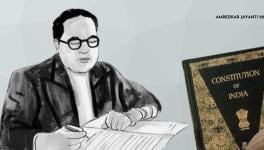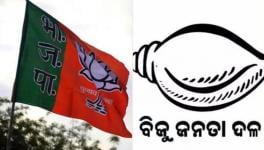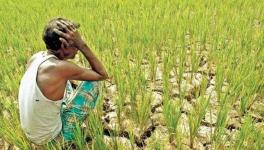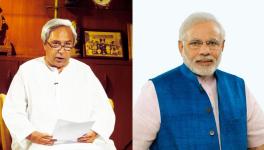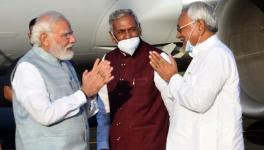Media's Callous Coverage of Agrarian Distress: New Vocabulary for Farm Loan Waivers
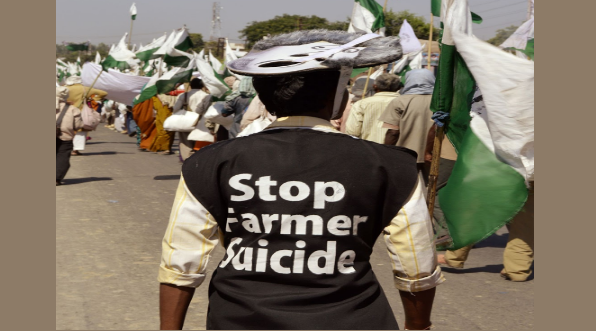
Image Courtesy: The Citizen
‘Take a look at how farm loan waivers are now becoming almost an epidemic across the country’, started one of the anchors on a news channel (India Today) that claims to set a ‘gold standard of journalism’.
The Oxford English dictionary defines ‘epidemic’ as ‘a widespread occurrence of an infectious disease’, or ‘a sudden, widespread occurrence of an undesirable phenomenon’. Another anchor on the same channel argued that the farm loan waiver would ‘put the states back’, essentially referring to loan waivers for farmers as necessarily having a negative effect on the economy of the respective states. Another news anchor on a different channel (NDTV) posed the following questions: ‘Can the states afford these massive loan waivers?’ and ‘Is good politics bad economics?’
It is not the case that the anchors or their guests on the above news programmes did not discuss the structural problems afflicting the agrarian sector in the country. But the usage of expressions such as ‘epidemic’ or ‘put the states back’ or ‘bad economics’ indicates their shallow understanding of the issues at hand. One of the newspaper editorials refers to loan waiver as ‘costly bailouts’ and that ‘profligacy (of states) is bad news for India’. There is not a word about the significance of agriculture for the economy as a whole in this editorial.
How do such negative expressions become interlinked with the discussions on agrarian sector? At least three possible explanations can be put forward to explain such usage. The first and foremost is that we have simply forgotten to ask the following question: How do we get our food? We go to the market, buy our groceries, cook and consume our food FULLSTOP. Rarely do we think about how the food that we consume has been produced. People forget to think that we need not worry about our food because the farmers of this country produce enough for all of us.
The second probable reason is the influence of the ideology of neoliberalism that has become predominant in the past four to five decades. The tenets of neoliberal ideology go like this: ‘If the government gives tax benefits to the corporate sector, then it is for employment generation and economic growth, and if the government gives debt relief to the farmers, then it is a burden on state exchequer’. Very few care to understand the linkage between the agriculture and industry. Both these sectors are interdependent upon each other, and slowdown in one can have a negative impact on the other. In India, about 50 percent of the population is dependent on agriculture for their livelihoods. If the agriculture is not remunerative, then 50 percent of the people will not have any significant purchasing power, and therefore, will not be able to demand goods produced by the industry.
The third possible explanation relates to the failure of the Indian media to question the narrative put forward by the state and its institutions. Reserve Bank of India Governor Urjit Patel warned of ‘fiscal slippages’ if the states went ahead with loan waiver for farmers. The media then starts parroting the sermon of fiscal discipline. One should ask Mr. Patel the following question: Why is RBI not in favour of disclosing the name of big corporates who have defaulted on their loans worth tens of thousands of crores? Does the Non-performing Assets of the banks not affect the fiscal position of the government?
The current discussion in media about the agrarian crisis in the country is far from adequate, but what led to this discussion?
Eight farmers lost their lives after they were shot at in a protest march in Mandsaur, Madhya Pradesh on June 6, 2017. What were farmers demanding from the Bharatiya Janata Party (BJP) government in the state? They were agitating for a debt relief, and fair prices for their produce. These two demands, even if met, will not be a panacea for all the difficulties faced by the farmers, but will help ease the burden to some extent. Have these demands taken the BJP by surprise? The answer is in the negative.
The newly elected Uttar Pradesh (UP) government waived the loans of the small and marginal farmers upto Rs. 1 lakh. The BJP declared in their 2014 election manifesto that the Minimum Support Price will be fixed at ‘cost+50 percent’. Narendra Modi, the then Prime Ministerial candidate of the party, also declared the same in his election speeches. Did the ‘56 inches chest’ Modi fulfil the promise made to the farmers of this country. In the last 3 years of the BJP government at the centre, this promise has not been kept. What has been the role of two pillars of a democratic society, namely the opposition and the media, in pressurising the government to meet its promise made to the farmers?
The impotent opposition parties are finding it extremely difficult to tackle the election machinery of the BJP. The Congress party proclaims itself to be the main opposition party, but its sole concern at this stage is to find an auspicious date to make Rahul Gandhi the president of the party. They have failed to find a date in the last three years. The ‘fearless in opposition’ leader, along with other leaders of the party, has no courage to say that Mr. Gandhi is not fit for politics. In the recently held UP election, the Congress won 7 out of a total of 403 seats. The party fought elections in coalition with Samajwadi Party. After the election result, Mr. Gandhi went missing, and was nowhere to be seen for many days. A political leader who cannot take responsibility for election defeat surely cannot run the oldest political party in India.
Nitish Kumar, the Chief Minister of Bihar, has the ability to connect with the masses. But his clean image has taken a dent due to his association with Lalu Prasad Yadav, a criminal convicted in fodder scam case. Mr. Yadav has been disqualified from contesting elections. His two sons are part of the Bihar government, and needless to say they take orders from their criminal father. Nitish Kumar is waiting for an opportune time to jump back into the lap of communal BJP, and therefore, cannot come out openly in favour of the issues raised by the opposition.
A national level agitation for improving the viability of the agriculture has the potential of bringing the BJP government down on its knees, but in the presence of impotent political leaders the government has nothing to worry about.
What kind of role has the fourth pillar of democracy, the media, played in the last three years? More often than not, they have been found wanting in their duty of ‘speaking truth to power’. Their only aim is to make profit, and therefore, cannot ask tough questions to the government on which they depend for their revenues through advertisements. How can Mukesh Ambani owned channels ask serious questions from the government when he has the freedom to use the image of PM Modi for the promotion of Reliance Jio without permission? News channels reported from Paris when PM Modi landed in Berlin recently. One has to cut costs to increase their profits. The mainstream media is not prepared to go into the interior parts of the country to report on the issues that really matter to the people.
The farmers of Tamil Nadu protested at Jantar Mantar for over a month, but their protest only got a token coverage from the mainstream media. Farmers become the focus of news only when they are dead. The farmers at Jantar Mantar consumed their own urine during their protest. This act by the farmers should have resulted in large scale protests led by the opposition parties, but that did not happen. The conscience of the opposition leaders has died, and perhaps will be alive after 2 years when they seek re-election.
The famers of this country should take matters in their own hands, and demand what is rightfully theirs. The cheerleaders of this government and impotent political leaders better wake up before it is too late.
(The writer is with the Research Centre for Historical Studies, Faculty of Arts, University of Groningen, Netherlands)
Disclaimer: The views expressed here are the author's personal views, and do not necessarily represent the views of Newsclick.
Get the latest reports & analysis with people's perspective on Protests, movements & deep analytical videos, discussions of the current affairs in your Telegram app. Subscribe to NewsClick's Telegram channel & get Real-Time updates on stories, as they get published on our website.













